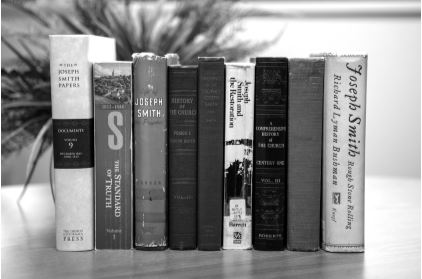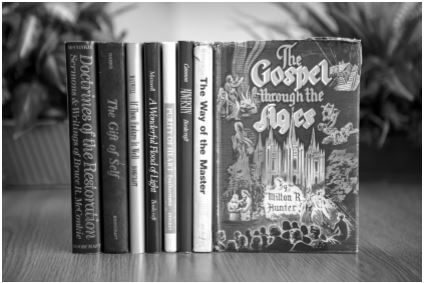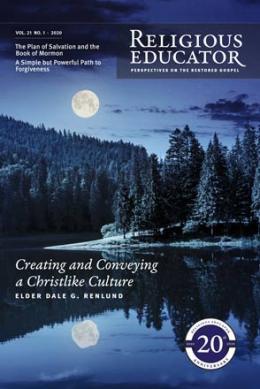Old Books, Old Methods, but Enduring (Even Eternal) Influence
Brent L. Top
Brent L. Top, "Old Books, Old Methods, but Enduring (Even Eternal) Influence," Religious Educator 21, no. 1 (2020): 171–81.
Brent L. Top (brent_top@byu.edu) was a professor of Church history and doctrine and a former dean of Religious Education at BYU when this was published.
 You see, teachers are like old books. They come and go. They get old and gray. Their names may not be widely known. However, they may have something far more important. . . . They have enduring, even eternal influence.
You see, teachers are like old books. They come and go. They get old and gray. Their names may not be widely known. However, they may have something far more important. . . . They have enduring, even eternal influence.
From a keynote address given at the BYU Latter-day Saint Educators Society conference on 28 June 2019.
I am honored to address you women and men who take teaching seriously, not just because of your vocation, but because of your Latter-day Saint heritage of education and your eternal identity as daughters and sons of God. Teaching is part of our spiritual DNA. The oft-used phrase “Education for Eternity” reflects the Latter-day Saint view of the importance of teaching and learning. But it is much more than a maxim, it is indeed our theology, as evidenced by numerous scriptural injunctions and examples of the importance of education for this life and eternity. Teaching is in our souls—part of our divine nature. We are all teachers, whether or not we are employed professionally as such. We are teachers as parents and children, sisters and brothers, friends and colleagues, Church leaders and ward members, neighbors and citizens. As human beings—daughters and sons of God—we are teachers—all the time—in all we do. President Thomas S. Monson often reminded us that “we are all teachers. We should ever remember that we not only teach with words; we teach also by who we are and how we live our lives.”[1] So it is in this context that I address you today—not in an academic or professional way as one would do in other settings and at other conferences, but rather as a fellow Latter-day Saint educator with all that title entails.
When I was in elementary school, there were many things that I didn’t particularly care for—like schoolwork. But there were a few things that I looked forward to and in which I was full engaged. First, Fridays. I loved to go to school on Fridays because on that day we got chocolate milk and the latest issue of the Weekly Reader. Then there were those special Mondays when we got to do show-and-tell. I always loved show-and-tell—both learning from my fellow students and also trying to see or learn something that I could share with the class. (I’m sure my parents didn’t always appreciate what I would take from home for show-and-tell.)
So today, although I didn’t bring chocolate milk or Weekly Readers (which I am sad to say ceased publication in 2012, after nearly a hundred years of engaging young minds), I am going to do a little show-and-tell.
My office is in the Joseph Smith Building on the BYU campus. It houses the faculty of Religious Education, and many of the religion classes are held there. At least once a semester, there is an activity in that building that has been interesting and enlightening to watch through the years. It is our book exchange and giveaway. As faculty members move offices or retire, they can put out books that they may not want to keep. Other faculty and staff, likewise, go through offices and discard those books they no longer want. Universities are a place where there is a free exchange of ideas, but for few weeks each semester in the Joseph Smith Building, there is a free exchange of books. It becomes a good way for younger faculty to build up their own libraries and for others to acquire books that they wanted but didn’t have or couldn’t afford to buy. Also, it is a blessing to those of us at the other end of our careers who won’t have room in our homes for all these books when we retire. After a period of time, we then allow students to take any of the leftover books they may want for themselves.
It is always interesting to look at the titles of books on the exchange table. It’s like a walk down memory lane in many ways. But for some of our young faculty and even younger students, it may be like being in a foreign country for the first time—or sometimes like they are actually on a different planet. Let me illustrate with my show-and-tell. Because of my own professional background, I’m going to use Church books as an illustration, but it would probably be the same in other disciplines as well.
None of my students would know the names or works of Milton R. Hunter, Sterling W. Sill, Mark E. Petersen, Marion D. Hanks, Vaughn J. Featherstone, Elaine Cannon, or Chieko Okazaki, just to name a few. I could go on and on.
Although their names may be unknown or forgotten and their books out of print and gathering dust on the shelves of Deseret Industries, these teachers had an enormous influence on me, my family, and subsequently my students and thousands of others.
Let me show you a few others and tell about their influence on me and others.
Elder Bruce R. McConkie. None of my students were even born when Elder McConkie passed away. Yet, whether they know it or not, their study of the Savior, the scriptures and doctrine of the Church has been influenced immeasurably by Elder McConkie’s teachings, both written and spoken. My own teaching and gospel scholarship were heavily influenced by him.
Elder Neal A. Maxwell. It’s hard to believe that he’s been gone fifteen years. Most of my students were mere preschoolers, toddlers, or not even born yet when Elder Maxwell—a lifelong educator—was blessing millions with his extraordinary eloquence and insight. He could say more in a sentence than many say in an entire book. His teachings on discipleship, consecration, and enduring to the end are incomparable.
You see, teachers are like old books. They come and go. They get old and gray. Their names may not be widely known. They may not have as much energy or enthusiasm in their classes as they once had. However, they may have something far more important than enthusiasm or classroom pizzazz. They have enduring, even eternal influence. You see, the most influential teachers—those who have really made a difference—are never forgotten. Their influence and, most important, teaching—like ripples created by rock thrown into on a still lake—go on and on, from one student to another, to those students’ families, their classes or quorums, and their children’s children. These influential teachers continue to touch countless others as time goes on and into eternity.
Each of us can remember a teacher, probably many, whose lives and teaching influence continue to bless us. I can think of Primary teachers, public school teachers, Young Men advisers, Church leaders, parents of my friends, seminary teachers, university professors, and so on. While I may not remember the exact subject matter or lessons they taught, I remember them and what they did for me. What was it that made those teachers so influential and life-changing?
President Harold B. Lee remembered a white-haired, seventy-something-year-old teacher who “had a peculiar ability, so it seemed, to burn deep into [his] soul the lessons of Church history, morality, and gospel truth in such a way that today, forty years later, [he found himself] still remembering and being guided by her lessons.” President Lee then went on to speak of this influential teacher and identify those characteristics that made her so good.
What was it that gave her the essential qualities of a successful teacher. She was not possessed of great secular knowledge nor was she well schooled in the theories and practices of modern pedagogy. Her appearance was plain and ordinary—that of a wife and mother in a small country community where necessity demanded long hours of toil from all family members. There were three endowments which, in my opinion, made her teachings effective: first, she had the faculty of making every pupil feel that she had a personal interest in him [or her]; second, she had a love for the gospel and had the ability to so aptly illustrate each lesson as to make it apply to our own lives; and third, she had an absolute faith in God and an unswerving testimony of the divinity of the restored gospel of Jesus Christ.[2]
 Church books from Brent Top’s bookshelf
Church books from Brent Top’s bookshelf
In a personal vein, let me highlight an influential teacher that not only blessed my life, but countless others. He certainly wouldn’t characterize himself a teacher, but that he was. In 1980 the Church News published a weekly feature titled “My Most Influential Teacher.” You can imagine my pleasant surprise when I opened the 20 December issue and discovered that the teacher being highlighted was my father, Norman Top. It was written by Darrol Gardner, who had been one of the Scouts in the troop my Dad led as Scoutmaster. Darrol wrote:
I was not active in the Church, except for Scouting. I was always on the edge of trouble. When I was in the Teachers’ Quorum the Bishop assigned [Brother] Top as my home teaching companion in hopes of activating me. He was not successful at the time, but he never gave up.
Years later, after I became a policeman, Top made another attempt at encouraging me to [more fully] embrace the gospel. [At the time I was not living as I should] but he told me of his feelings about me and why I should examine my life. I always knew he was right and felt that I must ponder and study more concerning the things he told me about the gospel.
I began attending services on a regular basis in 1967. On May 29, 1969 I was ordained bishop of the Iona [Idaho] Ward. Brother Top always followed my success and has shown his approval by his kind and loving expressions. He is a teacher who cared for me and never gave up.[3]
 Norman Top was an influential teacher. Courtesy of Brent L. Top.
Norman Top was an influential teacher. Courtesy of Brent L. Top.
Let me share with you a little about my father. A child of Danish immigrants, he struggled in school. English wasn’t his first language, and, additionally, he suffered from dyslexia, making reading and learning difficult. He had to quit school after eighth grade to hire out as a laborer on nearby farms to help support the family at the depth of the Great Depression. Although he later earned a GED and became a self-made businessman, he always felt at a great educational disadvantage to others. He wasn’t comfortable with public speaking. He felt ignorant and inadequate. Yet he was a teacher—an influential teacher—because he loved others, made them feel important, and instilled in them a desire to be better. He taught with eloquence, not in words or with academic knowledge, but with his example and goodness. His teaching built character. That’s what an influential teacher does. As President Russell M. Nelson taught, “The ultimate aim of education is the building of character. One trains only for tasks, while character becomes the substance of one’s eternal identity.”[4]
Teaching is more than conveying content, just like learning is more than memorizing facts. “The glory of God is intelligence,” the Lord declared, “or, in other words, light and truth” (Doctrine and Covenants 93:36). Influential teaching and what Elder Kim B. Clark calls “deep learning” require inspiration as well as information, the spirit as well as the mind. One can acquire truth and yet not possess light. “All knowledge is not of equal significance,” Elder Maxwell observed. “Something may be factual but unimportant. . . . Some truths are salvationally significant and others are not.”[5] The best teachers know the difference and help their students to acquire intelligence in the truest sense of the word.
We are all beneficiaries of great scholarship. But not all scholarship is enduring even though the influence of teachers can and should be. For example, the information I received in my seventh-grade biology class appears inadequate today in comparison to what has been learned in the decades (not centuries) since I was in seventh grade. But that doesn’t mean that I had a bad teacher or that I didn’t learn a great deal. In fact, quite to the contrary. I had a great teacher—an influential teacher—who truly captured my attention, instilled in me a curiosity about biology—how things work in life and nature—and taught me how to learn and seek out the best information available on the subject. The scholarship may not have been enduring, because we have learned so much more since, but the teacher’s influence was enduring.
Let me illustrate this with my show-and-tell bag of books. I am a professor of Church history and doctrine, so of course I will use Church history books to make my point. Once again, let me emphasize that the principle would apply to other subjects and settings.
One of the most influential books of my young life was The Latter-day Prophet: Young People’s History of Joseph Smith, by George Q. Cannon. It was a book for youth adapted from the biography first published in the 1880s. It may not have been great scholarship, at least by today’s standards. But it was great for a young man from southeastern Idaho in the 1960s. I don’t remember all the history in that book, but I remember what I felt as I read it. My testimony of the prophet of the Restoration began with that book.
As a student at BYU in the 1970s, I took a Church history class from Ivan J. Barrett, author of Joseph Smith and the Restoration. Brother Barrett was not an academic historian. Certainly, historians today could readily identify the deficiencies, perhaps even inaccuracies, in Brother Barrett’s book. However, he was one of the most influential teachers in my life, both through his class lectures and his book. More recently, I read and reread Richard Bushman’s biography of the Prophet Joseph Smith, Rough Stone Rolling. Dramatically different than the other biographies, Bushman’s book was far more academic and historical. It caused me some discomfort, but it also made me think deeply and look at the Prophet with different eyes. It was powerful too, but in a different way. It had a profound effect on me. Like George Q. Cannon’s book and Brother Barrett’s class, Bushman had an enduring influence upon me—even an eternal influence. I like to think that those books, even with their historical limitations and perspectives, have in turn influenced thousands who have heard (or read) my testimony of Joseph Smith through the years.
Today we are blessed to have the volumes of the Joseph Smith Papers Project with all the incredible information and insights they contain. They are top-notch historical scholarship. But that does not diminish the impact that History of the Church or Teachings of the Prophet Joseph Smith had on previous generations. Scholarship improves. Influence endures.
 Classic books from Brent Top’s bookshelf
Classic books from Brent Top’s bookshelf
Likewise, Church members (and many not of our faith) have been and will continue to be informed and inspired by the new multivolume history Saints. It proves that solid history, firmly founded on the best research available, does not have to be boring or emotionally distant. But once again, it does not diminish the light and truth I gained from Comprehensive History of the Church, by B. H. Roberts, or Essentials in Church History, by Joseph Fielding Smith, and numerous other histories I have read in my lifetime. Perspectives and methodologies differ, but each has had an enduring influence in my personal and professional life.
So, you see, teachers are like old books. Some are more knowledgeable and academic than others. Some have pedagogical deficiencies. Some, like Moses and Enoch, are “slow of speech” (Exodus 4:10; Moses 6:31). Yet each intends to help others increase their knowledge and love for learning. They seek to affect attitudes and behaviors in positive ways. Some achieve those objectives better than others. The older I get, the less I remember what I read or hear in a class or quorum. Similarly, there are old books and teachers that I cannot forget, though I may not remember all the details. Their influence continues in me and through me. The most significant knowledge that influential teachers can pass on to others is not just what is in their brains but what is in their hearts and souls and exemplified in their lives. President David O. McKay, a consummate educator whose teaching legacy continues, taught:
Gaining knowledge is one thing and applying it, quite another. Wisdom is the right application of knowledge; and true education—the education for which the Church stands—is the application of knowledge to the development of a noble and Godlike character.
A man [or woman] may possess a profound knowledge of history and of mathematics; [they], may be an authority in psychology, or astronomy; [they] know all the discovered truths pertaining to geology and natural science; but if [they have] not with this knowledge that nobility of soul which prompts [them] to deal justly with [their] fellow men, to practice virtue and holiness in personal life, [they] are not truly educated.[6]
There is one last thing in my show-and-tell bag. It is a copy of the comprehensive exam I took for my master’s degree in instructional media in 1980. Some of the questions today would be laughable, because educational technology has changed so dramatically since that time. I’m not sure that my grandchildren know what a reel-to-reel tape recorder is, let alone how to actually edit tapes by cutting and splicing. I don’t think they have ever seen slides or a slide projector or know how film was developed and prints were processed in a dark room. They look at our old cassettes and VHS videos and think Grandma and I must have stolen them from the Smithsonian.
Virtually all that I learned and practiced in my media production classes in that program is out of date today. But that doesn’t mean the process of learning, the interactions with other students and the opportunity to be mentored by outstanding faculty in more ways than just media production, is worthless.
I have been a professional religious educator in the Church Educational System for more than forty years. I have seen so many types of instructional media and educational methodologies come and go, come and go, and come again. Filmstrips, videos, games, simulations, object lessons, group projects, pair-and-share, PowerPoint, Learning Resource Centers, personal computers, iPhones, electronic scriptures, the Internet, online learning, digital databases, podcasts, flipped classrooms, blended learning—and I could go on and on. I have had influential teachers who were exciting and entertaining in the classroom, using cutting-edge technology and innovative pedagogy. I have had other powerful teachers who thought a blackboard was high-tech. There have been incredible teachers in my life who asked probing and insightful questions in class and others who never asked any questions.
Influential teachers are as varied in their approaches to teaching as there are methods and media. But they all have one thing in common. They understand that methods are a means to an end, but not the end in of itself. President Boyd K. Packer illustrated this principle so beautifully with a parable—the parable of the pearl and the box: “A merchant man seeking precious jewels found at last the perfect pearl. He had the finest craftsman carve a superb jewel box and line it with blue velvet. He put his pearl of great price on display so others could share his treasure. He watched as people came to see it. Soon he turned away in sorrow. It was the box they admired, not the pearl.”[7]
The Father’s work and glory is not that his children have “great lessons”: exciting audiovisuals, memorable object lessons, or the latest and greatest research on any given subject. Immortality and eternal life for his children are his ultimate desires. It is the pearl. “Eternal life,” President Gordon B. Hinckley declared, “will come only as men and women are taught with such effectiveness that they change and discipline their lives. They cannot be coerced into righteousness or into heaven. They must be led, and that means teaching.”[8] Inspired and inspiring teachers understand this and know that some things matter more than others and that enduring, even eternal influence cannot be had by focusing too much on media and methods at the expense of ultimate objectives.
I guess I am drawn to old books, old methods, and old teachers, because I am an old guy. In fact, on my favorite baseball cap that I often wear is the phrase “Old Guys Rule.” In reality, it is not the oldness of the books, methods, or teachers that I am fond of. It is the enduring, even eternal influence. I have old books that I will be glad to take to the dump and new books that I never want to lose. There are old teaching methods and attitudes that I am thrilled to be done with and new methods and technologies that are extraordinarily helpful in the learning process. There are old teachers that are—well, let’s just say old (I’m probably thinking of myself when I say that)—and young teachers who are wise beyond their years and teach me in surprising ways (I’m thinking of my grandchildren when I say that). Real, influential, soul-shaping, character-building teaching will never grow old nor be in too great of supply.
So to you Latter-day Saint educators—you who are professional teachers, you who write about the gospel or just love the gospel, you who are expert and creative in teaching techniques, and you who don’t even know how to spell technique, you who are mothers and fathers just trying to raise righteous and responsible children, you who are Primary teachers who every Sunday feel like you are just holding on for dear life, you teachers in whatever capacity who feel inadequate, you who just want to be better, you who desire influential teachers in the lives of your children, grandchildren, and those you love—I say, thank you. You represent all those teachers who have blessed my life. Because of the enduring influence and impact of teachers, I desire greater light and truth in my life and desire with all my heart to help others know the glory and love of God in theirs. May you be blessed in your desires and efforts to have enduring, even eternal influence in the lives of those you teach.
Notes
[1] Teachings of Thomas S. Monson (Salt Lake City: Deseret Book, 2011), 301.
[2] Clyde J. Williams, ed., Teachings of Harold B. Lee (Salt Lake City: Bookcraft, 1996), 444.
[3] Darrol Gardner, “My Most Influential Teacher,” Church News, 20 December 1980, 2.
[4] Teachings of Russell M. Nelson (Salt Lake City: Deseret Book, 2018), 96.
[5] Neal A. Maxwell, “The Inexhaustible Gospel,” in 1991–92 Devotional and Fireside Speeches (Provo, UT: Brigham Young University, 1992), 141.
[6] David O. McKay, Gospel Ideals: Selections from the Discourses of David O. McKay (Salt Lake City: The Improvement Era, 1953), 440.
[7] Boyd K. Packer, “The Cloven Tongues of Fire,” Ensign, May 2000, 7.
[8] Gordon B. Hinckley, “How to Be a Teacher When Your Role as a Leader Requires You to Teach,” General Authority Priesthood Board Meeting, 5 February 1969; quoted by Jeffrey R. Holland in “A Teacher Come from God,” Ensign, May 1998, 26.
